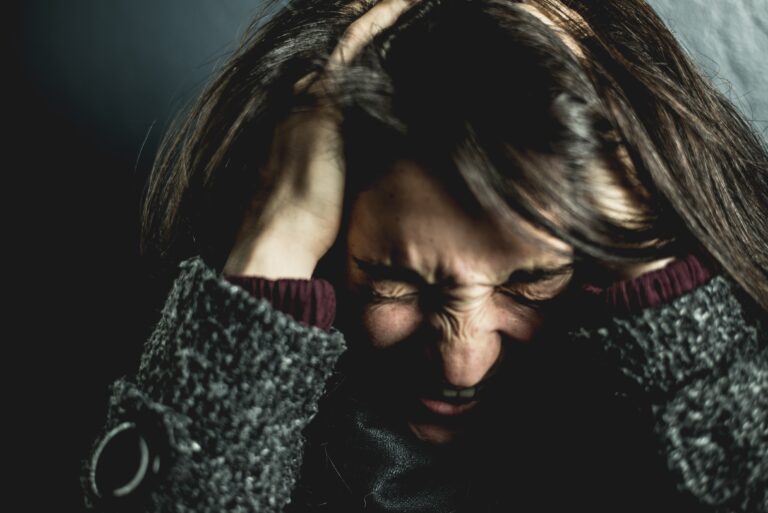What is Anxiety? / Symptoms / Causes
What is Depression? / Symptoms / Causes
How to overcome? / Natural way / Medical way
Having a healthy mind is just as vital as having a healthy body. A healthy mind believes in one’s ability to perform work with an optimistic approach, and always get ready to face any difficulty in this way. how can I reduce anxiety naturally?
In reverse, Anxiety and depression are two extreme conditions of a person’s mental health that can crucially impact a person’s thoughts, feelings, and daily life routine.
When a person goes through a mental disease, he often gets stuck in:
- Stress
- Anxiety
- Depression
- Mood swings
It causes hopelessness and a sense of insecurity. Life is a hope and when a hopeless approach comes to ruin the peace and stability of life. A person’s life remains stuck until and unless efforts are being put to let him come out of the mess.
How to reduce stress anxiety and depression? Here’s a brief explanation of human mental diseases and how to get rid of them.
Anxiety

Anxiety refers to excessive worry, overthinking, fear, or unease about future events or current situations. Being worried about personal life or anything is quite natural, but it can be classified as an anxiety disorder when it becomes chronic or overwhelming.
Common Symptoms:
Anxiety can manifest as physical symptoms including:
- Rapid heartbeat
- Sweating
- Trembling
The cognitive symptoms include:
- Excessive worry
- Racing thoughts
Causes of Anxiety:
Some major causes of anxiety are shown below:
Stressful Life Events:
Traumatic experiences or ongoing stressors can trigger anxiety.
Personality Factors:
Certain personality traits, like perfectionism or a tendency to be easily overwhelmed, can play a role.
Medical Conditions:
Some medical conditions or medications can cause or exacerbate anxiety.
Brain Chemistry:
Imbalances in neurotransmitters (chemical messengers in the brain) can contribute.
Genetics:
A family history of anxiety disorders can increase one’s sensitivity.
Depression

Depression, also known as ‘Major Depressive Disorder’ (MDD), is characterized by continuous feelings of sadness, hopelessness, and a lack of interest or pleasure in most activities such as thinking, eating, sleeping, and reacting. This state of mind generates mood swings and prolonged feelings of dissatisfaction.
Common Symptoms:
Depression can include emotional symptoms such as:
- Persistent sadness
- Irritability
- Guilt
The physical symptoms include:
- Increase appetite
- Fluctuate sleep patterns
The cognitive symptoms include:
- Difficulty concentrating,
- Suicidal thoughts
- Extreme mood swings
Causes of Depression:
Some main causes behind depression include:
Brain Chemistry:
Neurotransmitters are chemical messengers in the brain. Imbalances of neurotransmitters play a major role in mood swings and depression.
Genetics:
A family history of depression increases the risk.
Personality Traits:
Certain personality traits, like a tendency toward pessimism or perfectionism, may contribute.
Stressful Life Events:
Trauma, financial problems, loss, or other life stressors can trigger depression.
Medical Conditions:
Some medical conditions, such as chronic illness or hormonal imbalances, can be correlated with depression.
It’s essential to note that the causes of anxiety and depression are often multifactorial, meaning they result from a combination of genetic, environmental, and psychological factors. Moreover, individual experiences vary widely, and not everyone who experiences stress or any trauma will develop these conditions.
Effective treatment options for anxiety and depression typically include:
- Psychotherapy (talk therapy)
- Medication (for some individuals)
- Lifestyle changes (such as exercise and stress management)
- Support from loved ones.
Seeking help from a mental health professional is critical for proper diagnosis and tailored treatment plans. Mental health conditions are treatable; many people find relief with the right support and interventions.
How to Reduce Stress Anxiety and Depression?

Here’s a solution to every question of every one of you, who’s suffering from such mental health disorders. Reducing anxiety naturally involves adopting lifestyle changes, incorporating relaxation techniques, and sometimes seeking professional help. Here are some ways to reduce depression and anxiety without medication, you can appraise on:
Healthy Diet:
Maintain a balanced diet rich in whole foods, including fruits, vegetables, lean proteins, and whole grains. Avoid excessive caffeine and sugar, as they can exacerbate anxiety.
Sufficient Sleep:
Ensure you get 7-9 hours of quality sleep each night. Create a relaxing bedtime routine and keep a consistent sleep schedule.
Regular Exercise:
Physical activity releases endorphins, which are natural mood lifters. Aim for at least 30 minutes of moderate exercise most days of the week.
Keep Hydrated:
Dehydration can contribute to feelings of anxiety. Drink plenty of water throughout the day.
Social Support:
Spend time with friends and loved ones. Social support can provide emotional relief and help you feel less isolated.
Stress Management:
Learn to manage stress through techniques such as deep breathing, continuous muscle relaxation, or mindfulness meditation. These practices can help you stay calm in stressful situations.
Limit Stimulants:
Reduce or eliminate the consumption of alcohol, nicotine, and recreational drugs, as they can worsen anxiety symptoms.
Time Management:
Organize your day, set realistic goals, and prioritize tasks to reduce feelings of overwhelm.
Limit Media Consumption:
Reduce exposure to distressing news and social media, especially before bedtime.
Hobbies for Relaxation:
Engage in activities you enjoy, whether it’s reading, painting, playing music, or gardening. These can provide a mental break from anxiety.
Muscle Relaxation:
This technique involves tensing and relaxing different muscle groups to reduce physical tension associated with anxiety.
Limit Perfectionism:
Set realistic expectations and avoid the pursuit of perfection. Accept that nobody is perfect, including yourself.
Aromatherapy:
Some scents, like lavender and chamomile, are believed to have calming effects. You can use essential oils or scented candles for relaxation.
Herbal Remedies:
Certain herbs like valerian root, passionflower, and chamomile may help reduce anxiety. Consult with a healthcare professional before using herbal supplements, especially if you are on medication or have underlying health conditions.
Yoga and Tai Chi:
These mind-body practices combine physical movement with relaxation techniques and can help reduce anxiety.
Seek Professional Help:
Consider consulting a therapist or psychiatrist if your anxiety is severe or interfering with your daily life. They can provide therapy, counseling, or medication if necessary.
Cognitive Behavioral Therapy (CBT):
These therapies can help you learn to control physiological responses to anxiety and change negative thought patterns.
How Can I Reduce Anxiety Naturally?

To overcome anxiety and depression, firstly you have to fix your mind to the point that your mental condition should be healthy and strong in any way and you will change yourself for myself. There’s a question that emerged, How can I reduce anxiety naturally? Once you believe that your good mental health is indispensable, you will get your desired health outcomes by adopting a consistent approach.
Secondly, it’s essential to consult with a healthcare professional, especially if your anxiety is severe or persistent. They can provide tailored guidance and support to help you manage your anxiety effectively. These natural techniques can complement professional treatment but should not be replaced if needed.
Thirdly, another major factor behind anxiety and depression is Overthinking, it can be counterproductive and lead to unnecessary stress and anxiety.
How can I reduce anxiety naturally? There are some strategies to help you to reduce anxiety and depression, such as:
Mindfulness Meditation:
Practice mindfulness to stay in the present moment. Meditation techniques can help you become more aware of your thoughts and feelings without judgment.
Set Time Limits:
Give yourself a specific amount of time to think about a problem or decision. Once the time is up, make a choice and move forward.
Stay Busy:
Keep yourself occupied with activities and hobbies that you enjoy. An idle mind often leads to overthinking.
Talk it Out:
Share your thoughts and concerns with a trusted friend or family member. Sometimes, talking through a problem can provide clarity.
Write it Down:
When you find yourself overthinking, jot down your thoughts and concerns. This can help you organize your thoughts and gain perspective.
Limit Information Gathering:
While research is important, too much information can lead to analysis paralysis. Set a limit on how much information you gather before making a decision.
Practice Self-Compassion:
Be kind to yourself and recognize that it’s okay to make mistakes or not have all the answers.
Focus on Solutions:
Instead of dwelling on problems, concentrate on finding solutions. Break down complex issues into smaller, manageable steps.
Challenge Negative Thoughts:
When you catch yourself in a cycle of negative or irrational thinking, challenge those thoughts. Ask yourself if they are based on facts or assumptions.
Stay Physically Active:
Regular exercise can help reduce stress and clear your mind.
Set Goals:
Define clear goals and prioritize tasks to keep your mind focused on what’s important.
Practice Gratitude:
Cultivate a mindset of gratitude by regularly acknowledging the positive aspects of your life.
Seek Professional Help:
If overthinking becomes chronic and significantly impacts your daily life, consider speaking to a therapist or counselor. They can provide tools and strategies to manage your thoughts and emotions.
Thus, mind that it takes time and practice to change thought patterns associated with overthinking. Be patient with yourself and implement these strategies gradually to find what works best for you.
Medical Ways to Reduce Anxiety and Depression

This part will cover two major questions regarding severe mental disorders include, How can I reduce anxiety naturally? and, How to reduce stress anxiety, and depression?
Reducing anxiety and depression also requires a complete and proper medical approach. It’s important to consult with a healthcare professional to determine the most appropriate treatment plan for your specific situation. Here are some medical ways to reduce anxiety and depression:
Proper Medications
In some cases, when anxiety and depression stretch out at an extreme level then it’s compulsory to get a complete and proper medication to restore your mental health stability.
Anti-anxiety Medications:
Benzodiazepines, such as diazepam or clonazepam, are sometimes prescribed for short-term comfort of severe anxiety, but they should be used carefully due to the risk of dependence.
Anti-depressants:
These medications can help to manage the symptoms of anxiety and depression. Common classes of anti-depressants include selective serotonin reuptake inhibitors (SSRIs), reuptake inhibitors (SNRIs), serotonin-norepinephrine, and many others.
Mood Stabilizers:
These can help manage mood swings associated with conditions like manic depression.
Natural Supplements:
Some natural supplements like omega-3 fatty acids, St. John’s Wart (for mild to moderate depression), and certain amino acids (e.g., L-threonine, 5-HTP) may be considered to stable mental health, but their effectiveness can vary in some cases, and it should be used under medical guidance.
Cure with Sleep:
There is a huge chance of sleep apnea when you are going through medical treatment. Because some classes of prescription medications may worsen sleep apnea. Such as Benzodiazepines, which create a slow activity in your brain and nervous system. Sleeping pills and minor tranquilizers are medications that can be prescribed for severe anxiety or insomnia (difficulty getting to sleep or staying asleep).
Thus, the effectiveness of different approaches can vary from person to person, so finding the right blend of treatments may take some time and experimentation. Moreover, always follow the recommendations of your healthcare provider regarding medication and therapy to get the best outcomes out of them.






